| dc.contributor | Vall d'Hebron Barcelona Hospital Campus |
| dc.contributor.author | Bataller Fernández, Marina |
| dc.contributor.author | Sanchez Garcia, Almudena |
| dc.contributor.author | Garcia Mayea, Yoelsis |
| dc.contributor.author | Mir Perez, Cristina |
| dc.contributor.author | Rodriguez Hernández, M. Isabel |
| dc.contributor.author | Lleonart Pajarin, Matilde |
| dc.date.accessioned | 2022-06-15T13:00:51Z |
| dc.date.available | 2022-06-15T13:00:51Z |
| dc.date.issued | 2021-12 |
| dc.identifier.citation | Bataller M, Sánchez-García A, Garcia-Mayea Y, Mir C, Rodriguez I, LLeonart ME. The Role of Sphingolipids Metabolism in Cancer Drug Resistance. Front Oncol. 2021 Dec;11:807636. |
| dc.identifier.issn | 2234-943X |
| dc.identifier.uri | https://hdl.handle.net/11351/7692 |
| dc.description | Acid ceramidase (AC); Glucosylceramide synthase (GCS); Shingolipids |
| dc.description.abstract | Drug resistance continues to be one of the major challenges to cure cancer. As research in this field evolves, it has been proposed that numerous bioactive molecules might be involved in the resistance of cancer cells to certain chemotherapeutics. One well-known group of lipids that play a major role in drug resistance are the sphingolipids. Sphingolipids are essential components of the lipid raft domains of the plasma membrane and this structural function is important for apoptosis and/or cell proliferation. Dysregulation of sphingolipids, including ceramide, sphingomyelin or sphingosine 1-phosphate, has been linked to drug resistance in different types of cancer, including breast, melanoma or colon cancer. Sphingolipid metabolism is complex, involving several lipid catabolism with the participation of key enzymes such as glucosylceramide synthase (GCS) and sphingosine kinase 1 (SPHK1). With an overview of the latest available data on this topic and its implications in cancer therapy, this review focuses on the main enzymes implicated in sphingolipids metabolism and their intermediate metabolites involved in cancer drug resistance. |
| dc.language.iso | eng |
| dc.publisher | Frontiers Media |
| dc.relation.ispartofseries | Frontiers in Oncology;11 |
| dc.rights | Attribution 4.0 International |
| dc.rights.uri | http://creativecommons.org/licenses/by/4.0/ |
| dc.source | Scientia |
| dc.subject | Resistència als medicaments |
| dc.subject | Càncer - Tractament |
| dc.subject | Esfingolípids - Metabolisme |
| dc.subject.mesh | Sphingolipids |
| dc.subject.mesh | /metabolism |
| dc.subject.mesh | Neoplasms |
| dc.subject.mesh | Drug Resistance |
| dc.title | The Role of Sphingolipids Metabolism in Cancer Drug Resistance |
| dc.type | info:eu-repo/semantics/article |
| dc.identifier.doi | 10.3389/fonc.2021.807636 |
| dc.subject.decs | esfingolípidos |
| dc.subject.decs | /metabolismo |
| dc.subject.decs | neoplasias |
| dc.subject.decs | resistencia a medicamentos |
| dc.relation.publishversion | https://doi.org/10.3389/fonc.2021.807636 |
| dc.type.version | info:eu-repo/semantics/publishedVersion |
| dc.audience | Professionals |
| dc.contributor.organismes | Institut Català de la Salut |
| dc.contributor.authoraffiliation | [Bataller M, Sánchez-García A, Garcia-Mayea Y, Mir C] Grup de Recerca Biomèdica en Cèl•lules Mare de Càncer, Vall d’Hebron Institut de Recerca (VHIR), Barcelona, Spain. [Rodriguez I] Servei de Gestió d'Infermeria, Vall d’Hebron Hospital Universitari, Barcelona, Spain. [LLeonart ME] Grup de Recerca Biomèdica en Cèl•lules Mare de Càncer, Vall d’Hebron Institut de Recerca (VHIR), Barcelona, Spain. Spanish Biomedical Research Network Centre in Oncology, CIBERONC, Madrid, Spain |
| dc.identifier.pmid | 35004331 |
| dc.identifier.wos | 000744980900001 |
| dc.relation.projectid | info:eu-repo/grantAgreement/ES/PE2017-2020/PI20%2F00556 |
| dc.rights.accessrights | info:eu-repo/semantics/openAccess |

